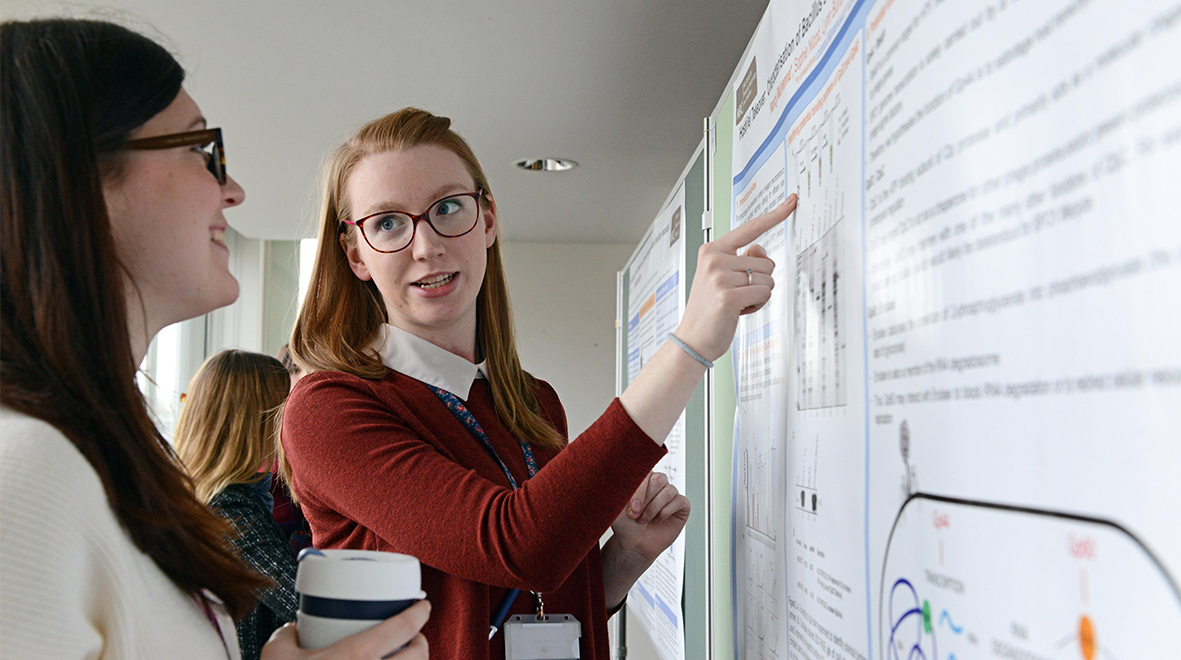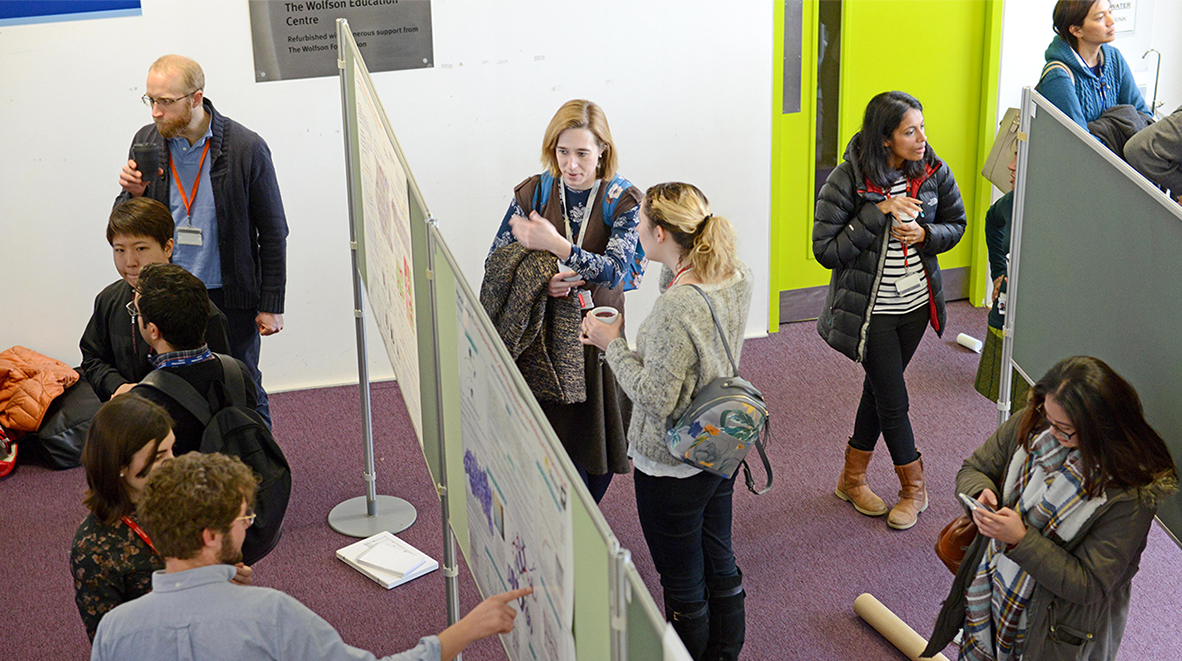
Following the annual Rising Scientist Day, Drs Myrsini Kaforou, Alex Thompson and Claire Byrne recount their experiences of becoming fully-fledged early career researchers and share their best advice for prospective postdocs.
The annual Rising Scientist Day at Imperial’s Hammersmith Campus offers PhD students the chance to share their research both with their peers, and a more general audience. In addition to poster presentations and networking opportunities, the showcase featured talks from those who had successfully made the transition from PhD to postdoc.
Myrsini Kaforou – Senior Research Fellow in Bioinformatics
I guess my journey might be quite different to that of the typical PhD student in the Department of Medicine. I started my studies in electrical and computer engineering, completed an internship at the Pasteur Institute in Paris, and then moved to London to complete an MSc course in Bioinformatics and Theoretical Systems Biology at Imperial. I had always wanted to use computational approaches to confront complex problems in biology and medicine. Therefore, I decided to pursue a PhD in Professor Michael Levin’s group in developing novel approaches for analysing large gene expression datasets to identify diagnostic signatures for tuberculosis.
While writing up my thesis, a colleague of mine forwarded me a call for post-doctoral fellowships from the Antimicrobial Resistance Collaboration at Imperial College, which I applied for successfully. My fellowship extended the work of my PhD to the bigger question of the use of host RNA diagnostics to identify bacterial infection to guide antibiotic use and tackle AMR by bridging clinical research and point-of-care assay development. I worked with Dr Pantelis Georgiou and his team in the Department of Bioengineering. At the end of this year-long post, I applied for a few different schemes and was successful in getting the Sir Henry Wellcome fellowship to work on understanding and diagnosing infectious diseases using multi-level omics data. This scheme offers recently qualified postdoctoral researchers the opportunity to start independent research careers.
Although I’m still in the early stages of my career, I can share some things that I think helped me to secure a fellowship. For me, knowing yourself, your strengths and weaknesses – and working on them – is key. Also, consider what you enjoy, and what works best for you: while some people thrive instability, others thrive in change. As competition is extremely high, it’s also essential to find ways to stand out by measurable outcome. Whispering scientific findings into a dark hole never helps, but publications, active and interesting social media accounts, reviewing papers, organising meetings and conferences, are all vital. Look out for yourself, be enthusiastic, show some evidence of independence, and apply your skillset to questions from a different field (ICRFs are really supporting that). Proposals can describe interesting and impactful questions, but they need to show feasibility so that funders will be willing to invest in you. Research is all about teamwork, so seeking support, advice and mentoring is always a good idea. However, it’s really important to invest in the person you are outside of academia, and nourish that part of yourself too.
Alex Thompson – Imperial College Research Fellow
Since October, I’ve been working as an Imperial College Research Fellow in the Department of Medicine. However, I originally came to Imperial nine years ago to study for a PhD in Physics. After completing my PhD, I took up two post-doctoral positions – first in the Department of Chemistry and then in Hamlyn Centre for Robotic Surgery (Department of Computing) – before finally moving to the Department of Medicine.
Throughout my career, my research has focussed on the use of optics – the study and control of light – to develop new technologies for biology and medicine. This has involved developing new diagnostic tools for early detection of cancer, studying important biological phenomena such as the formation of brain plaques involved in dementia, and fabricating microscale robots for the next generation of minimally-invasive surgery. As part of my fellowship, I’m now working to translate optical technologies to developing countries through the production of a new test for gut health that is cheap, robust and simple to use.
In my experience, it’s often factors outside of your research career that end up being the most important in determining your next steps. In terms of career advice: firstly, while it’s obviously important to plan your career, make sure that you are aware of all of the different opportunities that are available to you. I would suggest keeping an eye out for post-doc positions being advertised in related groups, fellowship deadlines, and calls for small grants such as seed funding and travel awards. Doing this will help to build your CV and to avoid missing out on the job opportunities that are most relevant to you. Lastly, I would advise thinking of your career as a ‘story’, and developing a narrative combing three key aspects: the research you are doing, the places you have done it, and the experience you have gained as a result. Career choices often feel like they have been made at random, but if you develop a clear narrative with those three ingredients, then you’ll have a good chance of selling yourself to potential employers and funders… even if your career decisions really were taken at random!
Claire Byrne – Research Associate
My PhD research focussed on the role of non-digestible carbohydrates on appetite regulation and energy homeostasis. In my final year, it hit me that I needed to figure out my next step. At this stage, my PhD hadn’t put me off academia – I still enjoyed it. I decided to speak to my supervisor – Professor Gary Frost (Chair in Nutrition and Dietetics) – about funding opportunities, and expressed that I was keen on staying on as a postdoc in his group. We applied for a Wellcome Trust Fellowship together as a follow-on from the data I got from my first paper, but I didn’t get it. I realised that the chance of getting my own funding was slim so early on in my career. Thankfully, as part of the Nestlé-Imperial collaborative, Gary gained funding for a project proposal he had submitted when I first expressed an interest in staying on in the group, and had named me as a postdoc on it. My quest for funding was over!
So, what’s my advice? I have a PhD checklist of sorts, which includes things that I aimed for, and some things I only realised were important afterwards:
- Attend and present your data at a conference: try to network with people that work on similar things to you. You never know who you will meet
- Try to publish your data or some data during your PhD: this will help when applying for postdoc positions or funding
- Join societies: find the most relevant ones to your research and join them. Look out for ones that give travel grants
- Apply for funding: this doesn’t necessarily have to be big pots of money. I received travel grants to pay for my conference trips, which looks good on your CV
- Participate in outreach work
- Be realistic about what is feasible in the timeframe you have
- Write your thesis! It takes so much longer than I ever expected
- Keep up with hobbies and friends during your PhD: you can’t work 24/7 (even if your supervisor wishes you did!)
My advice for transitioning to a postdoc position would be:
- Make sure it’s actually what you want to do, and that it will take you to where you want to be
- Speak to your PhD supervisor or mentor if you have one and ask for their advice: they might be happy to name you as a post doc on a grant they’re applying for, or perhaps be able to put you in touch with someone who can
- Find out which groups are working in your areas of interest: find out how many papers they’re publishing (and in which journals), and how many postdocs and PhD students they have
- Explore all funding routes: keep an eye on funding and jobs websites
- If you do get offered a postdoc, make sure you are going to gain something out of it
- Most importantly: believe in yourself!

Following the launch of the Faculty of Medicine’s reorganised academic structure on 1 August 2019, this post was recategorised to Department of Metabolism, Digestion and Reproduction.